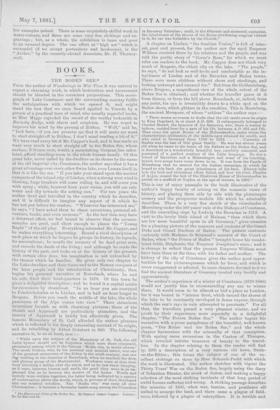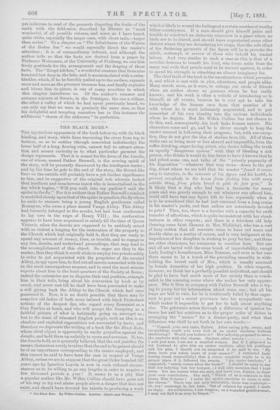BOOKS.
THE BODEN SEE.* Yttom the author of Wanderings in War Time it was natural to expect a charming work, in which instruction and amusement should be blended in the correctest proportions. This mono- graph of Lake Constance and the surrounding country fulfils the anticipations with which we opened it, and might stand the test that we once heard applied to Travels by a person of a practical turn of mind, who usually regarded books, as Miss Miggs regarded the sword of the worthy locksmith in Barnaby Budge, with alarm and suspicion. Ho was urged to improve his mind by the perusal of Eothen. "Well," said he, "look here,—if you can promise me that it will make me want to start straight off to Eothen, I don't mind reading a bit of it."
We have read every bit of Mr. Capper's book, and it has made us want very much to start straight off to the Boden See, whose surface, if frozen over, would, a painstaking Germa.n;bas calcu- lated, afford standing-room to the whole human family. Of this great lake, never called by the dwellers on its shores by the name of the old imperial city, Constance, the author says that it has a great advantage over every other Swiss lake, even Leman itself, in that it is like the sea. " If you take your stand upon the ancient ramparts of the inland city of Lindau, when a strong west wind is blowing, huge breakers will come rolling in, and will cover you with spray ; while, however keen your vision, you will see only water and sky towards the setting sun." For two years the author lived and travelled in the country which he describes, and it is difficult to imagine any aspect of it which he has not put before his readers. " Whatever has interested me," he says, " I have asked them to share excursions, personal ad- venture, books, and even sermons." As the last item may have
a deterrent effect, wo feel bound to observe that the sermon- samples are good, and short enough to please the " Young
Rapid " of the old play. Everything interested Mr. Capper, and he makes everything interesting. Round a vivid description of each place at which he lingers he groups its history, its legends, its associations ; he recalls the memory of its dead great men, and records the deeds of the living ; and although he reads the history of the past, and looks on at the history of the present, with certain idoes flees, his imagination is not untouched by the themes which he handles. He gives only one chapter to the Lake-dwellers and their times and to the Roman conquest of the later people and the introduction of Christianity, then begins his personal narrative at Rorschach, where he and his wife fixed their head-quarters in 1879. Of this town he gives a delightful description ; and he found it a capital centre for excursions by steamboat. "In an hour you are conveyed to Friedrichshafeu or to Lindau, and in half an hour longer to Bregenz. Before you reach the middle of the lake, the whole panorama of the Alps comes into view." These steamboat excursions furnish us with charming pictures; those of the Steinli and Appeuzell are particularly attractive, and the history of Appenzell is briefly but effectively given. The famous Monastery of St. Gall afforded the author pleasure which is reflected in his deeply interesting account of its origin, and its rebuilding by Abbot Gotzbort in 820. The following narrative is, to us at least, new :-
" While upon the subject of the Monastery of St. Gall, the old Latin hymns should not be forgotten which were there composed, prominent among which is the famous ' Media vita, in mode annuls.' The monk Notken, who, by his poetical and musical talent, was one of the greatest ornaments of the Abbey in the ninth century, was one do,' walking in the direction of Rorschach, when ho reached the deep and gloomy gorge of the Martinstobel. Workmen were at that time busy throwing a bridge over the abyss, and as he saw them hanging, as it were, between heaven and earth, the peril they were in so im- pressed him as to become the motive of the hymn. Words and melody were written together, the latter being indioated by a species of accentuation above the words, which, in process of time, developed into our musical notation. The Media vita' was sung all over Christendom ; it became a favourite battle-song among the Crusaders
• The Shoree and Cities of the Roden See. By Samuel James Capper. London : Do La Rue and Co.
in far-away Palestine ; until, in tho fifteenth and sixteenth centuries,. the inhabitants of the shores of the Mille attributing magical virtues to it, its use was forbidden by the Church."
A chapter on Lindau; " the Swabian Veuice," is full of inter- est, past and present, for the author saw the aged Emperor William received there by his relatives and the people, and was• told the pretty story of " Gorze's Rose," for which we must refer our readers to the book. Mr. Capper does not think very much of Bregenz, the oldest city on the lake. "The people,' he says, " do not look so well-to-do and comfortable as the in- habitants of Lindau and of the Bavarian and Baden towns. There were more children without shoes and stockings, and looking unkempt and uncared for." But from the Gebhartsberg, aboVe Bregenz, a magnificent view of the whole extent of the Baden See is obtained ; and whether the traveller gazes at it from thence, or from the bill above Rorschach, or, indeed, from any point, his eye is irresistibly drawn to a white spot on the. Baden shore, which glitters in the sunshine. This is Meersburg„ the ancient Merspurc, of whose " schloss " the author says :-
" There seems no reason to doubt that the old castle owes its origin to King Dagobert, in or about A.D. 628. It subsequently belonged to Charles Martel, the hammer of the Saracens, who, there is reason to believe, resided hero for a part of his life, between A.D. 691 and 741. Then came the great House of the Hohenstaufen, under whom the characteristic civilisation of the middle-ages attained its zenith, and
who ruled in Germany from 1188 to 1254 Conradin of Suabia was the last of this great family. He was but eleven years old when he came to the home of his fathers on the Boden See, and . is described as a wonderfully beautiful boy, carefully educated, and possessed of a perfect mastery of the Latin language. Ho was a friend of literature and a Minnesinger, and some of his touching, boyish love-songs have come down to us. It was from the Castle of Meersburg that he started for the Italian campaign, in which he. hoped to win back the great inheritance of his race. History tells. how the bold and chivalrous effort failed, and how his rival, Charles of Anjou, caused the last of the illustrious House of Hohonataufen to perish on a scaffold at Naples, at the age of sixteen, in 1260."
This is one of many passages in the book illustrative of the author's happy faculty of seizing on the romantic views of history, and placing them side by side with the picturesque scenery and the prosperous modern life which he admirably describes. There is a very fine sketch of the vicissitudes of Meersburg under the 500 years' rule of the Bishops of Constance, and the unavailing siege by Ludwig the Bavarian in 1313. A visit to the lovely little island of Mainau, " than which there are few more beautiful spots in all Germany," gives occasion for a pleasing picture of the manners and customs of the Grand Duke and Grand Duchess of Baden. The picture contrasts curiously with Madame de Remusat's account of the Court of Baden, when "the Prince of Baden" brought home his recalci- trant bride, St6phanie, the Empress Josephine's niece ; and it is strange to reflect that the present Emperor William must
have been there at the time, with his father and mother. The history of the city of Constance gives the author good oppor- tunities for the picturesqueness which he loves, and which is never exaggerated or affected. In some chapters devoted to it we find the ancient literature of Germany treated very lucidly and appreciatively.
The author's experience of a winter at Constance (1879-1880). would not justify him in recommending any one to winter there. It would seem to be almost as bad a place as London,. for it was bound in "intense frost, which caused the shores of the lake to be constantly enveloped in dense vapour, through which the sun's rays in vain attempted to penetrate." For all that, the travellers passed a very pleasant winter, and we profit by their experience, more especially in a delightful chapter, " The Frozen Boden See." The author begins his narrative with a prose paraphrase of the beautiful, well-known poem, "Der Reiter and der Boden See," and the whole chapter harmonises with the solemnity of that conception. With spring came excursions in the Canton of Thurgau, which revealed infinite treasures of beauty to the travel- lers. In the chapter relating to them the reader will find (p. 298) a description of a very curious old town, Stein- on-the-Rhine ; this forms the subject of one of the ex- cellent etchings on stone by Herr Schmidt-Peeht with which the work is illustrated. The author sketches with vigour the Thirty Years' War on the Boden See, largely using the diary of Sebastian Burster, the monk of Salem, and making a happy selection of the most striking incidents of that long period of awful human suffering and wrong. A striking passage describes the miseries of 1635, when war, famine, and pestilence all united to scourge the land, and there came a plague of field- mice, followed by a plague of caterpillars. It is terrible and
yet ludicrous to read of the peasants disputing the fruits of the earth with the field-mice, described by Minter as " most wonderful, of all possible colours, and some, as I have heard, quite white, especially the larger ones, with short tails,—larger than moles." To a chapter on "The Inhabitants of the Waters of the Boden See" we would especially direct the reader's attention ; it is of extraordinary interest, and although the author tells us that the facts are derived from a paper by Professor Weismann, of the University of Freiburg, we owe him lively gratitude for the arrangement and the draping of those facts. The " Kropf-felchen," a wonderful creature that lives nine hundred feet deep in the lake, and is accommodated with a swim- bladder, which, if he be forcibly palled up to the surface, expands more and more as the pressure becomes less, and finally explodes and blows him to pieces, is one of many novelties to which this chapter introduces us. Of the author's summer and autumn sojourn at Seewis, in the Prattigau, the one a village, the other a valley of which he had never previously heard, we can only say that we were in precisely the same case, so that his delightful and tempting narrative has in this instance the additional " charm of the unknown" in perfection.



































 Previous page
Previous page